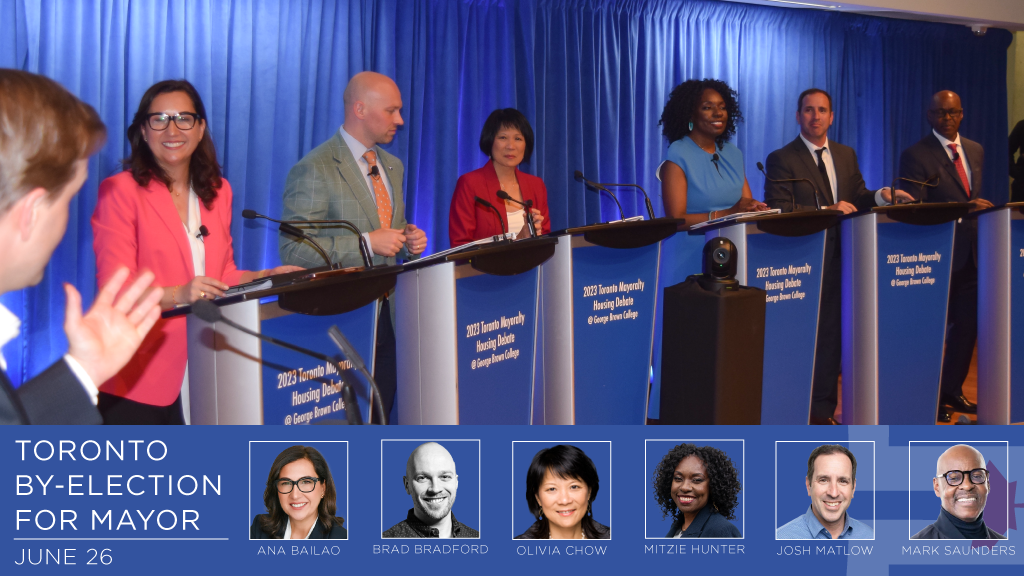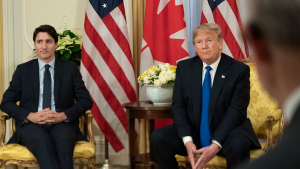A clear philosophical split has emerged among the top-tier Toronto mayoral candidates over how to spearhead a new age of housing in the city.
The divide was highlighted at a recent Toronto mayoral debate focused exclusively on housing.
Three contenders — former MP and city councillor Olivia Chow, fourth-term councillor Josh Matlow and former Liberal cabinet minister Mitzie Hunter — promise to set up new city housing agencies.
Two others — councillor Brad Bradford and former Toronto police chief Mark Saunders — were sharply critical of what they said would be an unwelcome new layer of bureaucracy.
“I’m not moving into a building built by government,” said Saunders to a smattering of jeers.
“Government’s role is to create the environment for building now for these affordable places to take place and government has failed,” he also said. “When you look at the average age of purpose-built rentals in Toronto, 90 per cent of purpose-built rentals are over 40 years old. It’s because people have done a lot of talking and not executing.”
The May 24 debate was hosted by the Residential �鶹��ý����ion Council of Ontario with other partners. The top six mayoral candidates as determined by polls were invited, with former councillor Ana Bailao joining Chow, Saunders, Hunter, Bradford and Matlow.
The byelection to choose a successor to former mayor John Tory is set for June 26.
Chow is proposing a City Homes Plan that would see the city acting as a developer, building 25,000 rent-controlled homes over eight years. Matlow would establish Public Build Toronto, which would develop an initial 15,000 rent-controlled market and affordable apartments. Hunter would create the Toronto Affordable Housing Corporation, which over its first six years would build 108 new developments on city-owned land.
“We talked about the supply challenges, there is just a whole apparatus of bureaucracy that slows things down and I’m pointing to three candidates on the stage that think the answer to building more housing is building more bureaucracy,” said Bradford, noting Toronto has one of the slowest housing approvals processes in North America.
“What we need to do is streamline the process to get the approvals done faster, get shovels in the ground and work with our nonprofits.”
Matlow denied his new housing agency would represent a new level of bureaucracy, suggesting he would reposition existing housing staff. He said the city’s Housing Now initiative has been a failure, with not a single shovel in the ground after six years.
“We have to move forward with affordable housing, deeply affordable housing,” said the councillor.
Bailao is proposing a Housing Plan that would build 285,000 new homes by 2031 including 57,000 purpose-built rentals. She said she would get more homes built including missing middle, laneway and coach housing through reforms to planning, zoning and land use regulations.
“You might not be able to buy the $1.5 million (home but) maybe getting together with your brother or sister you might be able to afford the $750,000,” said Bailao.
Frequent themes during the afternoon session were leadership, government intervention, taxes and knowledge of the housing file. Bailao, who served as chair of the city’s planning and housing committee, was one of several who accused other candidates of having unrealistic objectives.
“The first hire I’m going to do when I get elected mayor is a land economist for the City of Toronto,” she said. “So people learn how to read pro formas and actually stop making feel-good policies that will not put shovels on the ground.”
Hunter also highlighted her credentials, noting her experience as CAO for the Toronto Community Housing Corporation, “and I understand how to get things done. And so this is about making sure that we actually invest in neighbourhoods in mixed communities. It’s a spectrum of housing.”
Saunders and Bradford both criticized Chow’s plan to raise money through what she called a mansion tax — hiking the land transfer tax on the richest two per cent of deals — and a speculator’s tax.
Saunders referred to “fancy stuff” from Chow, who is leading in the polls by a large margin.
“She will raise taxes,” said Saunders. “You will hear the sounds of cranes leaving the city of Toronto and going to other jurisdictions.
“Hold on your seatbelt because…it’s going be a nightmare in the city of Toronto.”
Chow compared her search for more tax sources to the decisions a family makes when the roof is leaking and when medication is needed for a sick child. She also said the CMHC’s definition of affordable housing has to change from 80 per cent of market prices to one-third of income, representing a more realistic rent-geared-to-income standard.
Given her time as MP, she said she knows where to source funding at the federal level.
“The federal and provincial government has some role to play and we’ve been 10 or 12 years where we have not had a fair deal for the city,” Chow said.
Bradford suggested the federal government’s $4-billion rapid housing initiative for social housing is barely enough to support Toronto’s needs, let alone the whole country.
“Sometimes I feel like the federal government took Toronto for dinner and then walked out on the bill,” he said. “They talk a big game on housing, but there’s a lot more that they need to come to the table with.”











Recent Comments
comments for this post are closed